Did the 1980s give us a better movie than Tim Burton’s 1988 masterpiece Beetlejuice? (Well, OK, yes, Amadeus, but there are no ghosts in Amadeus.)
As a kid I identified with Lydia, of course—yanked away from her home and living with a wicked stepmother. Then the poor, terrified Maitlands, who just wanted their own space decorated their own way. Once I moved to New York, Delia seemed much less awful, and much more like an artist trying to make it in a city that will eat you if you’re not careful—who is forced by her husband to start over in a tiny town that she hates. And obviously, more recently, Betelgeuse the freelancer spoke to my soul.
But the older I get, and the more often I watch the movie, the more I admit to myself that there is only one true role model in this film, and that is Otho.
We meet him via my single favorite character introduction ever: Otho Fenlock climbing in through the window and tearing the sash down as he falls. Right away we know he’s not afraid to look foolish in order to honor ancient customs (I mean, it might not be a real custom, but whatever), he wants only good fortune for his friends, and he bounds back up without a word of complaint after he falls on his ass.
In earlier iterations of the script, Otho was a former East Village tarot reader, and a lot meaner than he is in Tim Burton’s film. The final cinematic Otho has been:
- one of New York’s leading paranormal researchers
- a member of The Living Theatre (a company dedicated to “BEAUTIFUL NON-VIOLENT ANARCHIST REVOLUTION” per their website)
- a hair analyst (briefly)
- an interior designer
Now he claims to have been good at each of these things, but who knows? (And how does one even define “success”?) Personally, I’m a fan of his design sensibilities, but YMMV. What I love is that, like every New Yorker I’ve ever known, he’s packed a half dozen careers into a single life, and he’s only in his thirties when we meet him. In the landscape of the ’80s movie, where men are cops, architects, lawyers, doctors who practice having near-death experiences in their off-hours, and women are…also all of these things but with HUGE hair and romantic ennui, Otho alone embodies the fluidity that has come to characterize modern adulthood. He was a millennial before the millennium! Does he have a degree in something or professional training? Who knows!
It doesn’t matter, because what matters is his practical experience and adaptability. He has tried a bunch of different careers, because Otho understands that life is a process, not a series of goalposts to be met. (And hell, after the exorcism, he probably understands that death is a process, too.) Because of the erratic CV, he can’t be defined by what he does for a living. He is simply OTHO, who is currently working as an interior designer.
Who knows what he’ll do next?
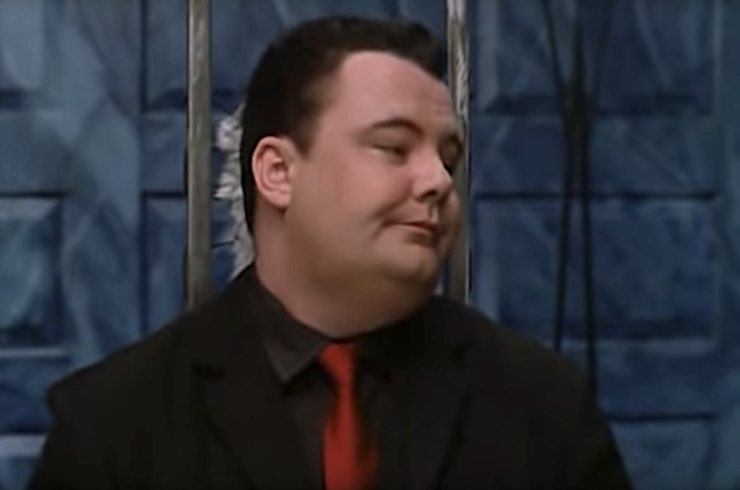
Otho’s impeccable aesthetic is marked by black-on-black suits, sharp hair, the occasional splash of red satin or turquoise jewelry. He’s a bit more subdued than Delia, who always seems to be trying too hard, and is actually aligned more with Lydia than anyone else in the film. He’s showing Baby Goths how to create a fashion future for themselves.
Otho is unmarried. He might be dating Grace? He might be queer? Actor Glenn Shadix was openly gay at a time when that was even less easy than it is now, so I tend to read him that way. We never know for sure, because it doesn’t matter. While most of the other adults are part of couples or heteronormative pairings—even Delia’s agent Bernard is only seen with his friend who writes for Art in America—Otho is a free agent. A spirit of chaos.
And sure, maybe he’s underemployed, and mooching off the Deetzes. But what’s definitely true is that, of all of Delia and Charles’ city friends, Otho is the only one who comes up to the country to support them the day they move in. And maybe Otho is making himself a bit of a third wheel, but it’s also clear that Delia is miserable in Connecticut, and only moved for Charles’ health. Otho is the one who has her back and supports her need to LIVE AND BREATHE ART with a delicately-raised eyebrow.
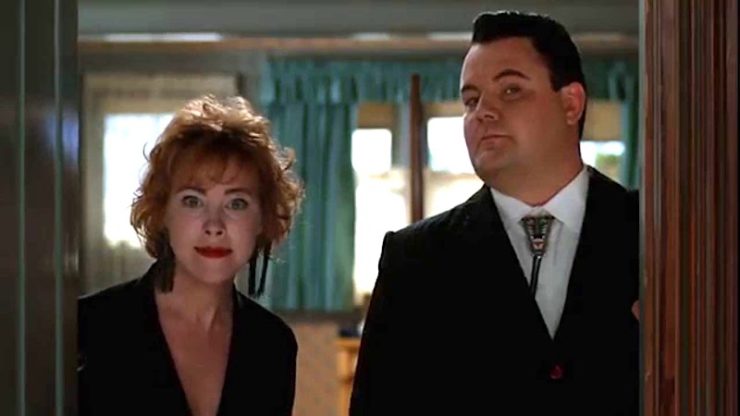
Plus he’s a successful occultist! A huge part of the film’s conflict lies in the fact that the living won’t see the dead, but Otho can usually sense them. He sees movement when the Maitlands are rushing around the living interlopers, and he feels Adam brush past on the stairs when he and Delia head up to explore the attic. He sees the Handbook for the Recently Deceased, yoinks it, and apparently reads it with ease. Most important? His exorcism works. For all that Lydia and Charles both mock him, he successfully brings the Maitlands back until everyone can see them (something the ghosts themselves couldn’t manage, and they were really trying) and almost re-kills them. Only Betelgeuse’s intervention saves them from the Lost Souls Room.
OK, so now that we’ve talked about why Otho is awesome, I need to go a little deeper for a sec. And for that I need to ask you a question.
Is this funny?
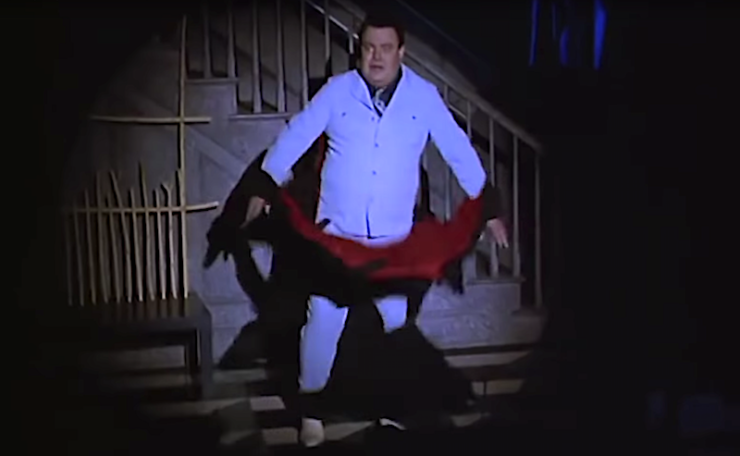
And if you think it’s funny, why?
In the film, aggressively heterosexual Betelgeuse assaults Barbara, ogles Delia, and tries to force the extremely under-age Lydia into a “marriage of inconvenience.” He tells Charles, “We’ve come for your daughter, Chuck,” and drops him from nigh-ceiling-height onto a tile floor. He also knocks Otho down an entire flight of stairs once, but after that his attacks turn to the psychological. He calls him “round boy” and, finally, strips him of his black-on-red séance attire, putting him in a blue leisure suit. He makes a point of humiliating Otho, the only male in the film who isn’t obviously heteronormative, by mocking his love of fashion (unseemly, un-masculine, y’know, queer af) and puts him in clothing that was considered the height of smarmy masculinity a decade earlier. The kind of thing that would have been worn, for instance, by the guys that bullied him for liking art and clothes when he was Lydia’s age.
Otho’s response is to scream and run offscreen.
We never learn what happens to him.
This whole scene is played as comedic, with Otho’s defrocking and scream as a punchline. We’re supposed to laugh at this, Betelgeuse delivering a comeuppance.
But here’s the thing: Otho never does anything wrong.
He’s hired by Delia to remodel her new house. He does this, we see the evidence, and she clearly likes his work. He listens to the family’s tales of hauntings, and offers his expertise as an occultist to help them. As soon as he realizes that the ghosts are real, he immediately spins it as a way for Charles to impress his old boss, Maxie Dean. He holds a séance to impress the Deans, and, as I mentioned above, when he realizes he’s hurting the Maitlands he apologizes and looks genuinely stricken—unlike the Deans themselves, who just rush off to Betelgeuse’s “show” with no concern for the decaying ghosts on the table.
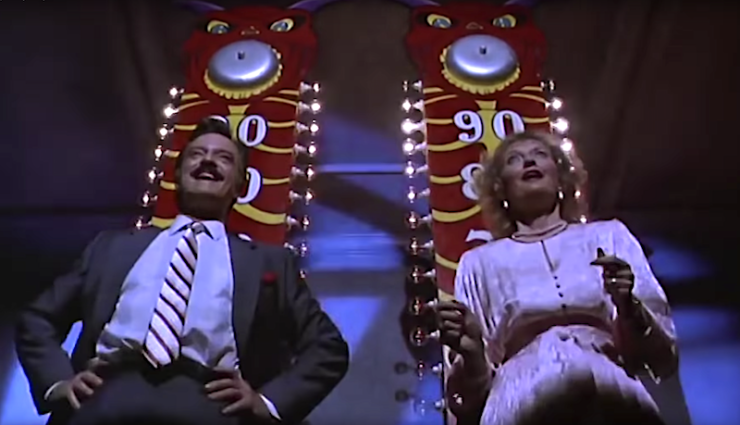
True, he doesn’t know how to reverse the exorcism—but why should he? He had no idea that he was going to be asked to do that, and given the words of the Janitor on the Netherworld, it’s entirely possible that a mortal can’t reverse the process. I suppose you could argue that it’s crappy of him to try to sneak out the door to escape Betelgeuse, but what the heck would you do, faced with the undead creature that already almost killed you by throwing you down a flight of stairs?
Throughout the film Otho is coded as a friend who essentially moves in to keep Delia entertained while Charles tries to recover from his nervous breakdown. We know he loves the arts, and he keeps a meticulous eye on his own appearance. There are words for this kind of person.
The “dandy,” the “extra man”—these were socially acceptable and relatively safe ways for men to be queer in society. You could attach yourself to a rich couple, and have the patronage and protection of a charming, bored woman, and her rich, busy husband, and the husband knew there wouldn’t be a scandal, and the wife knew she’d have a fun date for society events. Most Oscar Wilde plays have at least a couple of these guys (sometimes they turn out to be the villains), they pop up in Evelyn Waugh’s work, Byron’s poetry, and even in Jonathan Strange & Mr Norrell. Dipping briefly into real life, Truman Capote played this role to his high society “swans,” for instance by moving in with the high-society Paleys for a while, traveling with them to Europe, keeping weekly lunch dates with Babe Paley in Manhattan, offering her emotional support through her husband William’s many affairs.
The thing about this role, though, is that it was incredibly tenuous.
You had to keep the bored rich wife happy with your wit and charm. (Otho does this with aplomb); you had to make sure the husband liked you even though you were a sissy (Otho secures Maxie Dean for Charles); you had to keep your own personal life off the table (Otho brings Grace as his dinner party date, rather than a guy); you had to do all of this with style, because they were paying your bills.
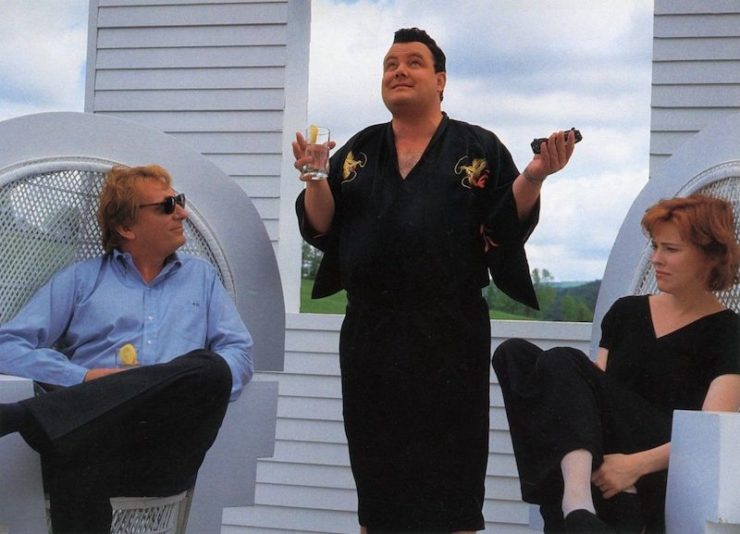
Otho didn’t just do his job as a designer, he performed a very difficult role in the Deetz family and society as a whole, and for this he was rewarded by a walking sexual harassment suit from beyond the grave chasing him out of his friends’ lives. Did he run to the nearest Metro North station and hightail it back to the safety of Manhattan?
Possibly.
But my personal headcanon is that following this trauma, he changed his name, moved to Ohio, and became the preacher in Heathers.
Leah Schnelbach has wanted that stupid robe since they were tiny! And they still want it! Come spray paint “mauve” with them on Twitter.










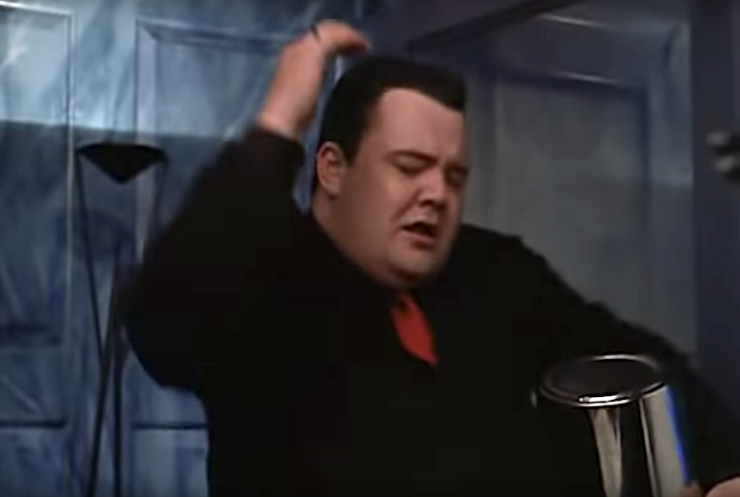
i never get tired of this movie
Love this movie. Looking back I never thought that Otho moved in, just that he was visiting frequently. As friends do.
I have very straight friends who are very like him. I myself like wearing a red tie with a black shirt and I’m as straight as you can get.
I remember when the movie came out that Otho was a bit, shall we say, portly. Looking at the screenshots above he looks normal, and everyone else is so skinny.
That is one interpretation. Another is that he is a pretentious urbanite twit with garishly bad taste who meddles in things in things he does not understand to bad effect and encourages the worst aspects of Delia’s personality to the emotional misery of her husband and daughter.
Obviously Otho died and became the mayor of Halloweentown.
Otho is alright, but I prefer him as Associate Bob from Demolition Man.
Thank you for this wonderful essay. And for championing the obvious gay character. He was a definite role model. And, I agree, the leisure suit scene made no sense to me when I saw the film in the cinema. But then, Hollywood rarely knows what to do with queer characters.
I worked on “Heathers.”
Glenn Shadix was a blast on set. He had serious health issues at the end and past away way too young.
@3 Exactly.
The name of the film is what? Bettlejuice. No BJ and no movie. Thus HE is the best character. This essay overthinks things. Otho is as you say, a pretentious, twit (and I think that is what the director and scriptwriter were making fun of)
@7 Steve Berman – “obvious” gay character? Way to lock a character down according to stereotypes. He wasn’t the picture of Hollywood tough guy masculinity, he was slightly effeminate, so he’s obviously gay?
Could he have been gay? Sure, and nothing wrong with that. The actor was, after all. But just as straight actors regularly play gay characters, gay actors play straight characters. There is nothing (or else I’m positive it would have been mentioned in the article) in the movie that definitively makes Otho gay.
Also (not directed @7) – Beetlejuice is terrible. He’s a bully and he represents the worst inclinations of men in particular and humanity in general. It’s not the Deetzes that need the comeupance – all they did was buy a house. It’s Beetlejuice that needs the comeupance, and the Maitlands need to come to terms with the idea that when you’re dead, you don’t get to keep your damn house. There are only two main characters that didn’t do anything wrong in all this, and they are Otho and Lydia.
The name of the film is what? Bettlejuice. No BJ and no movie. Thus HE is the best character.
I’m not sure that logic works every time. Consider, for example, Jaws.
@9 I’ll never understand people who get up in arms about critique. The writer isn’t ‘overthinking’ things, unless one considers any thinking to be overthinking.
@11 Well, Jaws probably is the best character in Jaws. If they wanted to name that movie after the villain they would have called it Mayor Vaughn. But yeah, Beetlejuice is definitely not the best or most interesting character in Beetlejuice. He has, and is written to have, absolutely zero nuance.
What blows my mind is that Adam is played by Alec Baldwin. I’m not gonna say he’s aged badly, that would be mean, but he definitely looks like a completely different person now.
#10
I stand by my assessment of Otho being obviously gay. And thank you, Daniel, for letting the Internet know that “there is nothing wrong” with a gay character. I was relieved.
Just a reminder to keep the comments civil and constructive in tone. You don’t have to agree with the article, or each other, but this is a thoughtful, celebratory essay–let’s take it in the spirit in which it was intended.
@13 – I said “there’s nothing wrong” as a statement of my personal opinion because I had just made a statement that could be read as anti-gay. It was a clarification, not me “letting the internet know” as if I was trying to make some kind of novel statement.
Once again: This is a reminder to keep the comments civil and constructive in tone. You don’t have to agree with the article, or each other, but this is a thoughtful, celebratory essay–let’s take it in the spirit in which it was intended.
Let’s move on, and get back to discussing the movie/essay.
@12: Funny thing is, the cartoon version of Beetlejuice actually has, I think, a fair lot of nuance and layers while still being basically the same core character, just, you know, with at least a bit of a redeemable sympathetic side to him.
I guess it comes with the dual territory of having to appeal to a wider audience while also having more time to develop a personality.
I always get a kick out of reading essays trying to argue that a character who’s a pretty horrible person’s flaws are actually virtues just because the author identifies with said character.
@10. The Deetzes did more than just buy a house. They were planning on exploiting the ghosts while getting their big city capitalist friends to help turn the little town into some tacky supernatural theme park. They definitely needed to be knocked down a peg or two—just not in the terrible way Beetlejuice wanted.
And that’s what we see in the end. They’re free of their big city greed. I only wish Otho had been shown again, preferably sitting in a fishing boat, decked out in LL Bean with a cocktail in his hand.
@19. You’re not wrong and I could have been clearer. I noted that the Deetzes “just wanted to buy a house” but then at the end said that the only characters who were really innocent in all this were Otho and Lydia. I failed to draw the line from Point A to Point B to explain why the Deetzes weren’t really innocent after all, and you pointed out the exact reason. They wanted to exploit the Maitlands. So did Otho, but I didn’t feel his heart was really in it, and he was genuinely remorseful when he realized he was hurting them.
@20. Yeah, you’re right. Otho did seem genuinely remorseful.
A shame we never got a spinoff with Lydia and Otho. Maybe as supernatural detectives or something like it. That would’ve been very cool.
RIP, Glenn Shadix
Great. You just ruined one of the only 2 Tim Burton movies that I like (the other being Ed Wood) and one of the only 2 movies with Alec Baldwin that I like (the other being The Hunt for Red October (which is the only Jack Ryan movie that I like)). Oh dear. This is making me sound really cranky. There is a lot of stuff that I like. Honest.
Regarding the issue of gender stereotypes in film:
To a large degree, it depends on the time period in which a movie is made. A male character with some stereotyped feminine characteristics would be intended to be perceived as homosexual by audiences for quite a long part of Hollywood’s history. Because of their usefulness in conveying characterizations, stereotypes are often useful tools for narrative creators, but they’re also limited to what a culture considers acceptably possible.
In a more modern work, being both not stereotypically masculine and somewhat stereotypically feminine does NOT mean that a male character is supposed to be gay. But films from older, earlier periods? Yes.
And since men acting like women is considered funny in a way women acting like men isn’t, it generally means that the character is meant to be comic relief, which Otho clearly is.
melendwyr@23:
Who do you think you are bringing your calmly stated, common-sense opinions to a heated internet debate?
Beetlejuice is one of my favorite movies, and I always appreciate your take on it. I have to admit, I generally have written Otho off as an example of pretentious, snobby, shallow, trendy-fake-New-Age-spiritual and so I didn’t mind when he gets is commeupance in the form of a leisure suit (and fwiw, I never realized that this was meant to be some type of ‘masculine’ attire. I just saw it as afflicting him with wearing white after Labor Day or violating some fashion faux pas, and basically a statement on how shallow he is.)
That said, the last time we watched it (I’m getting my kids into it) I did think that it was at least nice he came out to see Delia and support her (I don’t think it ever occurred to me that he was living there) – so this has given me at least a few things to think about :)
Lisamarie@25
Personally, I’m not buying the leisure suit as masculine attire argument. Gay men wore leisure suits, the suit itself became a fad because of the disco explosion, which was a mainstreaming of queer culture in the 70’s.
I think the joke is that leisure suits hadn’t just fallen out of fashion, but they were the antithesis of the dark, baggy suits by Italian and Japanese designers like Armani, Comme des Garcons, and Yohji Yamamoto that were the uniforms of wealthy and eccentric Manhattanites in the mid to late 80’s.
@26. Right, the jokes in Beetlejuice are all fairly broad and obvious, and the joke here is by the late ’80s leisure suits were hideous. It was something everyone was embarrassed to remember. Dear lord, people actually wore those things!
My take was that the transformation of Otho’s clothes was horrifying, not because it was a leisure suit, but because it was a polyester suit, i.e. cheap.
What’s the opposite of the classic, well-made, bespoke black suit? A cheap, ill-fitting, garish white leisure suit. It’s not about masculinity, it’s about taste and style. Equally awful would have been a hawaiian shirt with bermuda shorts, paired with white socks and sandals.
@27
In my defense, I was forced. I was also 9. Worse yet – it was corduroy.
@23
“men acting like women is considered funny in a way women acting like men isn’t”
A counter to that is Twelfth Night, along with several other Shakespeare plays (though Twelfth Night is the best of that genre) and all the modern takes on that like Just One of the Guys.
Beautiful article, but a common mistake (one I made until I started reading the credits) is that Otho brings Beryl to dinner, not Grace. Beryl’s the one in the beryl-colored outfit, Grace is in gold. It’s confusing because Charles asks “People will pay big money for this, right, Grace?” and she nods as Beryl says “The Enquirer is offering $50,000 for proof of life after death.” Charles does look at Grace when he asks the question, but is looking at Beryl after she makes the comment. Also, I’ve always thought that Otho deserved to be humiliated by being seen in an outfit that was out-of-fashion, and the gag is funny. After all, he’s clearly a coward trying to sneak out of the house. He turned out to be a real “fair weather friend”!
Great article!
I always took Beetlejuice’s putting Otho in the powder-blue leisure wear as strictly an assault on Otho’s fashion senses. For a hip, au courant fashionista, what could have been a worse punishment? But I do see your interpretation as being possible. On the other hand, while Beetlejuice is selfish and, to an extent, “evil,” he never struck me as being cruel or bigoted.
Fun stuff to think about!